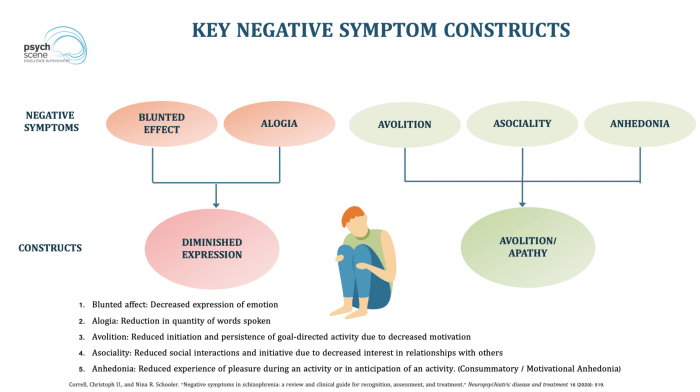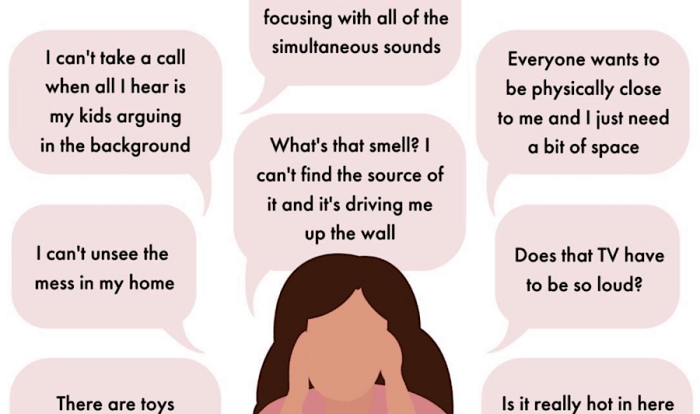Which pair consists of negative symptoms of schizophrenia – The topic of negative symptoms of schizophrenia has garnered significant attention in recent years, as researchers and clinicians delve into the intricate mechanisms underlying this complex condition. Negative symptoms, characterized by a diminished capacity for emotional expression, social interaction, and motivation, pose unique challenges in the management of schizophrenia.
This exploration aims to shed light on the specific symptoms that fall under the umbrella of negative symptoms, providing a comprehensive understanding of their nature and impact.
Negative Symptoms of Schizophrenia

Negative symptoms are a group of symptoms that involve a reduction or absence of normal behaviors and emotions. They are often considered to be the most disabling symptoms of schizophrenia, as they can significantly interfere with a person’s ability to function in everyday life.
Examples of Negative Symptoms
Some common examples of negative symptoms include:
- Alogia: A reduction in speech output
- Avolition: A lack of motivation or drive
- Anhedonia: A loss of interest in pleasurable activities
- Asociality: A lack of interest in social interactions
- Affective flattening: A reduction in the expression of emotions
Causes of Negative Symptoms: Which Pair Consists Of Negative Symptoms Of Schizophrenia

The exact causes of negative symptoms are not fully understood, but they are thought to be related to a combination of biological, psychological, and environmental factors.
Biological Factors
Biological factors that may contribute to negative symptoms include:
- Abnormalities in brain structure and function
- Neurotransmitter imbalances
- Genetic factors
Psychological Factors, Which pair consists of negative symptoms of schizophrenia
Psychological factors that may contribute to negative symptoms include:
- Cognitive deficits
- Low self-esteem
- Hopelessness
Environmental Factors
Environmental factors that may contribute to negative symptoms include:
- Social isolation
- Stressful life events
- Substance abuse
Treatment of Negative Symptoms

There is no cure for negative symptoms, but there are a number of treatments that can help to manage them. These treatments include:
Medication
Medications that can be used to treat negative symptoms include:
- Antipsychotics
- Mood stabilizers
- Antidepressants
Psychotherapy
Psychotherapy can be used to help people with negative symptoms to improve their social skills, cope with stress, and develop more positive coping mechanisms.
Social Skills Training
Social skills training can help people with negative symptoms to learn how to interact with others in a more positive and effective way.
Prognosis for Negative Symptoms

The prognosis for negative symptoms is variable. Some people with negative symptoms may experience a gradual improvement over time, while others may experience more persistent symptoms. The prognosis is often worse for people who have a longer duration of illness and who have more severe symptoms.
Course of Negative Symptoms
Negative symptoms typically develop gradually over time. They may first appear in adolescence or early adulthood, and they may worsen over time if left untreated.
Impact on Quality of Life
Negative symptoms can have a significant impact on a person’s quality of life. They can make it difficult to hold a job, maintain relationships, and participate in social activities.
Treatment Outcomes
Treatment can help to improve negative symptoms and improve a person’s quality of life. However, it is important to note that there is no cure for negative symptoms, and treatment may not be able to completely eliminate them.
Clarifying Questions
What are the core negative symptoms of schizophrenia?
The core negative symptoms of schizophrenia include alogia (poverty of speech), avolition (lack of motivation), anhedonia (inability to experience pleasure), and asociality (withdrawal from social interactions).
How do negative symptoms differ from positive symptoms of schizophrenia?
Positive symptoms of schizophrenia involve an excess or distortion of normal functions, such as hallucinations, delusions, and disorganized speech. Negative symptoms, on the other hand, represent a deficit or reduction in normal functions.
What are the treatment options for negative symptoms of schizophrenia?
Treatment options for negative symptoms of schizophrenia include medication, psychotherapy, and social skills training. Antipsychotic medications can help reduce positive symptoms, while psychotherapy and social skills training can address the cognitive and social deficits associated with negative symptoms.
